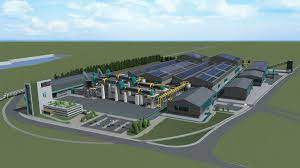Business secretary Grant Shapps today delighted Britain’s battery makers and EV chargers, travelling to Teesside to announce plans for Europe’s first ever large-scale refinery producing lithium in ‘merchant’-level quantities and quality.
The soft white metal is critical to batteries and devices used in renewable power, in automotive charging and components used in consumer electronics. The world in 2040 is projected to need four times more critical minerals, including lithium, than it does today.
Green Lithium Refining, set up in January 2021 and now headed by Sean Sargent, Dominic Kiernan and Alex Cheesman, is behind plans for the plant, to be located in the controversial Teesside Freeport. Up to 250 continuing jobs in manufacturing, plus 1,000 more ensured for the plant’s construction, are promised as part of the deal.
The firm intends Teesside to host the world’s first merchant-scale lithium refinery outside Asia.
Europe has no big lithium refineries. In late 2017 the EU Commission set up the European Battery Alliance, but with only sketchy plans for ore processing.
The UK government has backed Green Lithium with a grant of more than £600,000 through the Automotive Transformation Fund, a £1 billion pot primed the month after an original founding trio set up Green Lithium.
“This is levelling up in action” D-BEIS secretary Shapps commented. “We’re backing companies, like Green Lithium here in Teesside, to grow the new, green industries across the UK, sparking jobs and growth for decades to come.
In May, the company signed a deal to source lithium ore from behemoth commodities trading firm Trafigura.
The highly conductive alkali metal, easily worked at room temperatures, is currently mined or extracted from salt flats, in locations as far afield as south America, the US, China and Australia.
Andes’ “lithium triangle”
Prospectors are seeking for new sources adding to the 80 million tonnes of ore identified worldwide in 2019 by the US Geological Survey.
The ‘lithium triangle’ of Bolivia, with 21 million tonnes, Argentina’s 17 million tonnes and Chile with 9 million tonnes, head the world’s treasure stores.
The Andes mountains make exploiting those reserves difficult, with only Chile producing 18,000 tonnes of untreated ore in 2019.
Even the US, with 6.8 million tonnes of reserves, produced in 2019 from only one site, a brine-extraction plant in Nevada. In the same state the following year Elon Musk acquired rights to source the metal from brine pools close to Tesla’s battery Gigafactory in the desert.
UK industry reaction to today’s Teesside announcement was energised and warm. For the Green Finance Institute, programme director Lauren Pamma observed:
“The UK currently produces around 2GWh of battery capacity a year, but will need to ramp up to over 90GWh a year to maintain the car industry at its current size. Key to establishing this capacity is building a world-leading, home-grown supply chain from raw material processing through to recycling.
“The Teesside lithium plant is a great example of how the public and private sectors can work together to deliver just that” said Pamma.
A GFI report in May advised its client the Coalition for the Decarbonisation of Road Transport that investing billions now in EV batteries and their supply chain could yield £ 24 billion to the UK economy by 2025. But investment must be rapid to head off European competition, the report warned.
Full GFI report here.




